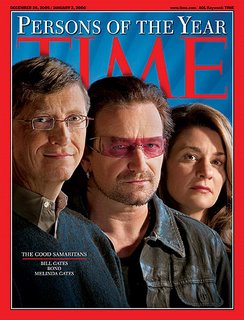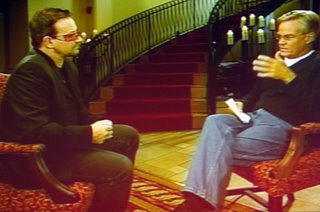
I was predisposed to be enthusiastic since I've been a U2 fan ever since 1983's "War" album. More than that, Bono's charitable social work on AIDS, debt relief, and fair trade during the last couple of years has really captured my attention as it has the world's (Bono shared Time Magazine's Persons of the Year Award last year with Bill and Melinda Gates under the heading "Good Samaritans." This link to the cover story is worth visiting and reading.). You might be one of those people quick to label all three as "liberals" or "naively idealistic." Don't. You run the risk of being labeled "reactionary" or even "ignorant." While you may not agree with all of their methods, their mission is laudable from all points on the policital spectrum. As the Time article puts it, "The challenge of 'stupid poverty'--the people who die for want of a $2 pill because they live on $1 a day" speaks of "lives...being treated as if they weren't valuable." Yes, we may always have the poor with us. But that doesn't absolve us from being sensitive and responsive to their plight, nor does it free us from the obligation to try to reduce the breadth and depth of their poverty While the work itself is noteworthy, what's more significant is the motivation behind it. I became aware of this reading a book entitled Bono In Conversation with Michka Assayas--a long-time friend of the band. The conversations took place between 2001 and 2005 as Bono's nonmusical work was gaining steam. Christian Music Today has an extended series of excerpts here that I'd encourage you to read if you're curious. What was obvious was his deep Christian faith in exchanges like this:
While the work itself is noteworthy, what's more significant is the motivation behind it. I became aware of this reading a book entitled Bono In Conversation with Michka Assayas--a long-time friend of the band. The conversations took place between 2001 and 2005 as Bono's nonmusical work was gaining steam. Christian Music Today has an extended series of excerpts here that I'd encourage you to read if you're curious. What was obvious was his deep Christian faith in exchanges like this:
Assayas: I think I am beginning to understand religion because I have started
acting and thinking like a father. What do you make of that?
Bono: Yes, I think that's normal. It's a mind-blowing concept that the God who created the universe might be looking for company, a real relationship with people, but the thing that keeps me on my knees is the difference between Grace and Karma.
Assayas: I haven't heard you talk about that.
Bono: I really believe we've moved out of the realm of Karma into one of Grace.
Assayas: Well, that doesn't make it clearer for me.
Bono: You see, at the center of all religions is the idea of Karma. You know, what you put out comes back to you: an eye for an eye, a tooth for a tooth, or in physics—in physical laws—every action is met by an equal or an opposite one. It's clear to me that Karma is at the very heart of the universe. I'm absolutely sure of it. And yet, along comes this idea called Grace to upend all that "as you reap, so you will sow" stuff. Grace defies reason and logic. Love interrupts, if you like, the consequences of your actions, which in my case is very good news indeed, because I've done a lot of stupid stuff.
Assayas: I'd be interested to hear that.
Bono: That's between me and God. But I'd be in big trouble if Karma was
going to finally be my judge. I'd be in deep s---. It doesn't excuse my
mistakes, but I'm holding out for Grace. I'm holding out that Jesus took my sins onto the Cross, because I know who I am, and I hope I don't have to depend on my own religiosity.
Assayas: The Son of God who takes away the sins of the world. I wish I could believe in that.
Bono: But I love the idea of the Sacrificial Lamb. I love the idea that God says: Look, you cretins, there are certain results to the way we are, to selfishness, and there's a mortality as part of your very sinful nature, and, let's face it, you're not living a very good life, are you? There are consequences to actions. The point of the death of Christ is that Christ took on the sins of the world, so that what we put out did not come back to us, and that our sinful nature does not reap the obvious death. That's the point. It should keep us humbled… . It's not our own good works that get us through the gates of heaven.
Assayas: That's a great idea, no denying it. Such great hope is wonderful, even though it's close to lunacy, in my view. Christ has his rank among the world's great thinkers. But Son of God, isn't that farfetched?
Bono: No, it's not farfetched to me. Look, the secular response to the Christ story always goes like this: he was a great prophet, obviously a very interesting guy, had a lot to say along the lines of other great prophets, be they Elijah, Muhammad, Buddha, or Confucius. But actually Christ doesn't allow you that. He doesn't let you off that hook. Christ says: No. I'm not saying I'm a teacher, don't call me teacher. I'm not saying I'm a prophet. I'm saying: "I'm the Messiah." I'm saying: "I am God incarnate." And people say: No, no, please, just be a prophet. A prophet, we can take. You're a bit eccentric. We've had John the Baptist eating locusts and wild honey, we can handle that. But don't mention the "M" word! Because, you know, we're gonna have to crucify you. And he goes: No, no. I know you're expecting me to come back with an army, and set you free from these creeps, but actually I am the Messiah. At this point, everyone starts staring at their shoes, and says: Oh, my God, he's gonna keep saying this. So what you're left with is: either Christ was who He said He was—the Messiah—or a complete nutcase. I mean, we're talking nutcase on the level of Charles Manson. This man was like some of the people we've been talking about earlier. This man was strapping himself to a bomb, and had "King of the Jews" on his head, and, as they were putting him up on the Cross, was going: OK, martyrdom, here we go. Bring on the pain! I can take it. I'm not joking here. The idea that the entire course of civilization for over half of the globe could have its fate changed and turned upside-down by a nutcase, for me, that's farfetched …
Bono later says it all comes down to how we regard Jesus:
Bono: … [I]f only we could be a bit more like Him, the world would be
transformed. …When I look at the Cross of Christ, what I see up there is all my s--- and everybody else's. So I ask myself a question a lot of people have
asked: Who is this man? And was He who He said He was, or was He just a
religious nut? And there it is, and that's the question. And no one can talk you into it or out of it.

Filmed in the lobby of a Dublin hotel not far from Bono's home, the video was primarily just the two guys sitting in chairs "Barbara Walter's style" talking to each other about their faith lived in the reality of today's world (there was also some great music and concert footage from the Elevation Tour). I should mention that yes, he was wearing the glasses (pink-tinted on this occasion). And, yes, I'd already shaved my head before seeing that he'd done nearly the same. For forty minutes, we all sat and listened to a very compelling personal testimony and a gut-wrenching challenge to love people in the way that Jesus commanded. I'll share some of what he said that hit me in my next post.






No comments:
Post a Comment